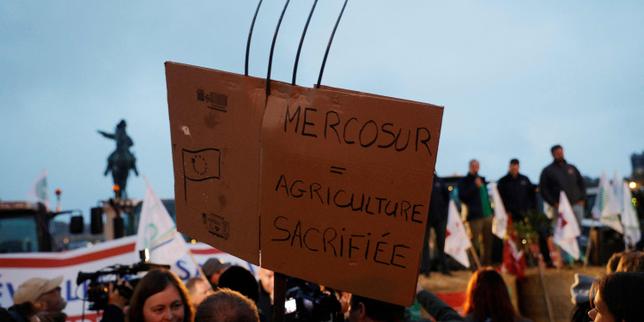French Farmers Protest EU-Mercosur Trade Agreement Amid Agricultural Concerns
French farmers protest the EU-Mercosur trade pact, fearing increased competition from imports.
- • FNSEA leads nationwide protests against the EU-Mercosur agreement.
- • Farmers showcase imported goods at demonstrations as examples of unfair competition.
- • The trade agreement aims to eliminate over 90% of tariffs between the EU and Mercosur countries.
- • Farmers are concerned about the differing production standards impacting local agriculture.
Key details
On September 26, 2025, French farmers, led by the Fédération nationale des syndicats d’exploitants agricoles (FNSEA), staged significant protests against the recently approved EU-Mercosur free trade agreement, which they argue threatens local agricultural standards and livelihoods. The protest included demonstrations in front of supermarkets and prefectures, with farmers showcasing imported goods like Chilean apples and American nuts that they claim undermine local production.
The EU-Mercosur agreement, approved by the European Commission earlier this month, aims to eliminate over 90% of tariffs between the EU and the Mercosur countries, which include Argentina, Brazil, Paraguay, and Uruguay. This trade deal has sparked concern among French farmers, who fear increased competition from South American imports that do not adhere to the stringent EU agricultural standards. FNSEA President Arnaud Rousseau denounced the agreement, criticizing the importation of products under claims of ecological responsibility while local farmers are required to adhere to strict environmental practices.
The concern for local farmers centers on potential market destabilization from increased imports of key agricultural commodities, including beef, poultry, sugar, honey, and rice, which could be imported tariff-free. Farmers have expressed heightened anxiety over what they perceive as unfair competition, as these imports may not meet the rigorous standards imposed on French agricultural products.
According to reports, various agricultural unions, though united in their opposition, are taking different approaches to the protests. The FNSEA's call to action also coincides with symbolic protests in major cities, including blocking access to restaurants that serve imported meat. As the EU-Mercosur agreement still awaits ratification from EU member states and the European Parliament, discussions around the potential impacts of this trade deal continue intensifying amidst farmer protests.
This article was translated and synthesized from French sources, providing English-speaking readers with local perspectives.
Source articles (2)
Source comparison
Date of European Commission's approval of the trade agreement
lefigaro.fr
"The European Commission greenlighted this trade deal earlier this month."
lemonde.fr
"The agreement was initiated for ratification by the European Commission in early September."
Latest news
Middle East Conflict Sparks Surge in French Fuel Prices Amid Supply Concerns
Macron Announces Major Shift in France's Nuclear Policy with Increased Arsenal and European Integration
French Government Prioritizes Safety of Nationals Stranded Amid Middle East Conflict
French Prisons Reach Record Overcrowding with 86,645 Inmates as of February 2026
Pau's Local Election Campaign Gathers Momentum Amid Broader Political and Economic Concerns
French Companies and Regions Accelerate Efforts in Nature-Related Economic Transition
The top news stories in France
Delivered straight to your inbox each morning.


